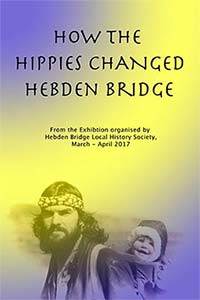History Society Report
How the hippies shaped Hebden Bridge
Speakers: Chris Ratcliffe and Jenny Slaughter
Thursday, 2 November 2017
 A packed meeting of the Hebden Bridge Local History Society were taken back to a time easily within the memories of most of the audience by Chris Ratcliffe and Jenny Slaughter, who both moved to the town as part of an influx of people searching for an alternative lifestyle – the hippies.
A packed meeting of the Hebden Bridge Local History Society were taken back to a time easily within the memories of most of the audience by Chris Ratcliffe and Jenny Slaughter, who both moved to the town as part of an influx of people searching for an alternative lifestyle – the hippies.
Both speakers conjured up that era at the end of the 1960s that was full of ambition about living in a way that was more creative, satisfying and equitable. For some people this meant involvement in revolutionary politics and experiments with living communally, for others it was setting up adventurous creative enterprises and dropping out of the conventional rat-race.
Hebden Bridge itself was in decline at this time, its identity as a textile town fading, and its terraces of working people’s houses under threat of being demolished.
On the hill tops at the same time many small farms had proved unviable and had been abandoned. For Chris, fully involved in the political causes of the time while squatting in London, Hebden Bridge provided an opportunity to establish new ways of ‘living the revolution’ and following those principles.
For Jenny, the chance to live a more satisfying creative life was found in one of the many ruinous farms. It is clear that a ‘hippy’ life was not a dreamy option, but involved hard work in making properties habitable and becoming self-sufficient. At the heart of the ventures was a desire to live and work co-operatively and sustainably.
There was music and mysticism but also entrepreneurship. Jenny’s work included making and selling hippy dresses and establishing the café-cum-shop-cum social hub ‘On the 8th Day’ in Manchester. The vegetarian principles of many of those involved in the ‘counter culture’ led to the establishment of co-ops to source and sell wholefoods – Aurora Foods was established as a workers’ co-op in Hebden Bridge, and also became a centre for musicians poets and artists to gather. Inevitably such places attracted more kindred spirits to make their home in the town, and to shape its future.
One of the major legacies of this influx has been the creativity for which Hebden Bridge and the surrounding area has become famous. Small independent producers of craft products grew up, and music was ubiquitous, with barns, pubs and the Carlton ballroom hosting hugely popular events before the days of the Trades Club.
Although these ‘offcumdens’ may have appeared alien to the long time residents of Hebden Bridge, a brief look at their history shows a remarkable fit with a town noted for both its non-conformism and its co-operative movement.
Jenny and Chris were both involved in gathering material for the very successful History Society exhibition held at the Town Hall, which led to many requests to produce a book recording these times. This is their intention, and they would love to find more photographs from that era, recording some of the exciting happenings and hippies of Hebden Bridge.
Hebden Bridge Local History Society meets fortnightly at 7.30 on Wednesday evenings at Hebden Bridge Methodist Church. On 8th November Steven Wood will be talking about his research into the Withins Farms, famed for their supposed inspiration for Wuthering Heights. All are welcome. Free to members, non-members £3.
With thanks to Sheila Graham for this report
Details of all the Society’s activities can be found on the website and you can also follow us on our Facebook page.
See also


